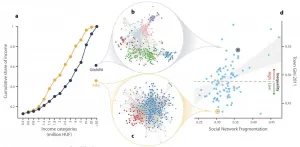(Press-News.org) [Vienna, Feb 18, 2021] Communities worldwide are trying to address inequality. One promising approach could be to look at the design of a city, according to research with real-world data in the journal Nature Communications.
An international team of scientists, including members of the Complexity Science Hub Vienna (CSH), show that urban planning directly influences the formation of social networks in a city and subsequently the socio-economic equality or inequality of its citizens.
"We know how important social networks are for our social and economic outcomes," explains CSH researcher Johannes Wachs, one of the authors of the paper. Social relations provide individuals with essential access to resources, information, economic opportunities and other forms of support. In towns with more evenly distributed social networks, the economic inequality tended to be much lower than in towns with highly fragmented social networks, the study shows.
The scientists even found a vicious cycle: the higher the fragmentation of social networks, the higher was the income inequality in a town over time.
On the wrong side of the tracks?
But where does such fragmentation come from? The researchers argue that one root cause lies in geography.
To test their hypothesis, the complexity scientists used a large dataset from Hungary with 2 Mio individuals from about 500 towns. The data were retrieved from iWiW, a once - and before Facebook - very popular social media platform used by nearly 40 percent of the Hungarian population.
"Urban sociology research says that people cannot easily build social ties when they are separated by large physical obstacles such as rivers, railways, highways or walls," Johannes Wachs points out. "It was impressive to see this confirmed in our data: we could see evidence of strong physical boundaries in a city just by looking at its social network."
City design and income go hand in hand
"We hypothesized - and confirm it with our findings - that if valuable ideas and information cannot float freely through a city because that city is physically fragmented, which in turn causes social fragmentation, we will see inequality. We clearly see how strongly geography and income inequality are related."
Of course, social networks do not form in a vacuum. A lot of different mechanisms influence with whom we are in regular contact. For instance, humans tend to befriend similar people ("homophily"). Friends of friends also show the tendency to become friends too ("triadic closure"). Yet, the iWiW data found geographic indicators of towns as an additional strong predictor of fragmentation in social networks.
The findings are of great value for city planners.
„You hardly can change social networks directly via public policy - you cannot force people to interact if they don't want to," says the CSH researcher. Yet, towns and cities frequently make decisions about the built environment that will have effects on how their inhabitants can meet and interact. "If these decisions reflect on our findings, we predict that cities will have fewer problems with inequality in the future," Johannes Wachs concludes.
INFORMATION:
G. Toth, J., R. Di Clemente, A. Jakobi, B. Sagvari, J. Kertesz, B. Lengyel, "Inequality is rising where social network segregation interacts with urban topology," Nature Communications (18 Feb 2021) doi: 10.1038/s41467-021-21465-0
About the Complexity Science Hub Vienna (CSH):
The mission of CSH Vienna is to host, educate, and inspire complex systems scientists dedicated to making sense of Big Data for the benefit of society. Scientists at the Hub develop methods for the scientific, quantitative, and predictive understanding of complex systems. Focal areas include the resilience and efficiency of socio-economic and ecological systems, network medicine, the dynamics of innovation, and the science of cities.
The Hub is a joint initiative of AIT Austrian Institute of Technology, Central European University CEU, Danube University Krems, Graz University of Technology, International Institute for Applied Systems Analysis IIASA, Institute of Molecular Biology IMBA, Medical University of Vienna, TU Wien, University of Veterinary Medicine Vienna, Vienna University of Economics and Business, and Austrian Economic Chambers (WKO).
An irregular sleep schedule can increase a person's risk of depression over the long term as much as getting fewer hours of sleep overall, or staying up late most nights, a new study suggests.
Even when it comes to just their mood the next day, people whose waking time varies from day to day may find themselves in as much of a foul mood as those who stayed up extra late the night before, or got up extra early that morning, the study shows.
The study, conducted by a team from Michigan Medicine, the University of Michigan's academic medical center, uses data from direct measurements of the sleep and mood of more than 2,100 early-career ...
Researchers have published new insights into the causes of mortality in sepsis
Loss of endothelial function is induced through two different pathophysiological processes and is a major driver of septic shock, a life-threatening drop in blood pressure
The first pathway originates in the loss of the endothelial barrier triggering an increased production of the repair hormone bioactive Adrenomedullin (bio-ADM), which also has the undesired side effect of vasodilation
The second threat acting on the endothelial function is the release of the protease DPP3 into the bloodstream which degrades angiotensin II, a process resulting in decreased vascular tone and cardiac output
The different ...
The UK's first national lockdown from March 2020 and its immediate aftermath saw a massive shift in consumer habits that was initially mandated but then lingered as shops and restaurants opened but risks from the virus remained.
A new study from the universities of Cambridge and Newcastle used data from the ONS to compare retail, hospitality and online sales in the UK between March and August 2020 with average figures for the same months for the years 2010-2019.
Researchers took an approach normally used to estimate cumulative excess deaths to try and measure the impact of the COVID-19 shock on sales of UK retailers and restaurants.
They say their economic models suggest that shops predominantly selling food, such as supermarkets, saw ...
Researchers from Dana-Farber Cancer Institute, the U.S. Food and Drug Administration (FDA) and the American Association for Cancer Research (AACR) are releasing recommendations designed to address the under-representation of African Americans in clinical trials for multiple myeloma (MM), a blood cancer that is twice as deadly in this demographic as in whites.
The initiative, publishing today in the AACR journal Blood Cancer Discovery, is a "road map" for designing myeloma clinical trials to eliminate racial bias by including more African American patients, as well as gathering "real-world" data from health records about the effects of drugs in African American patients. Through this joint workshop initiated by ...
Among strategies to curb hospital prices among the commercially insured population in the U.S., direct price regulations such as setting rates are likely to achieve greater savings than other approaches like increasing competition or improving price transparency, according to a new RAND Corporation study.
But price regulations face the greatest political obstacles and historically have been strongly opposed by medical providers, according to the report.
Setting prices for all commercial health care payers could reduce hospital spending by $61.9 billion to $236.6 billion annually if the rates were set as high as 150% to as low as 100% of the amounts paid by the federal Medicare program, ...
An analysis published in the Journal of the American Geriatrics Society indicates that while adults aged 75 years and older do not benefit from taking aspirin to prevent cardiovascular disease, many do so on a regular basis. Also, although statins are known to help prevent heart problems in older adults who have experienced a cardiovascular event, many of these individuals do not take a statin.
The analysis included data on 11,392 U.S. adults aged 50 years and older who were surveyed from 2011 to 2018. Investigators found that more than half of participants took aspirin or a statin.
"Healthcare providers should inform their older patients about appropriate aspirin use so that they can avoid misuse of aspirin, which can be easily purchased over the counter. Ultimately, ...
African Americans have higher rates of prostate cancer and are more likely to die from the disease than other groups in the United States, likely due to socioeconomic factors, healthcare access problems, and tumor biology. A new review published in Cancer Reports focuses on the biological differences in the development of prostate cancer across ethnicities.
The authors note that these differences could be leveraged to improve the diagnosis and treatment of prostate cancer in African American men, ultimately reducing incidence and mortality rates associated with the disease.
"We provide a comprehensive review of the significant research in recent years that has examined the molecular and genomic reasons for unequal cancer burden in African American and Caucasian American ...
In an analysis of information on 448 patients with heart failure who were discharged from a hospital in Sweden, 20.3% of patients were readmitted to the hospital within 30 days, and 60.9% were readmitted within 1 year. The END ...
A study published in Environmental Toxicology and Chemistry has found long-term impacts of the 2010 Deepwater Horizon oil spill in the northern Gulf of Mexico on bottlenose dolphins' immune function.
Bottlenose dolphins from an area that received prolonged and heavy oiling were temporarily captured, sampled, and released as part of health assessment programs. The animals were compared with dolphins from an area where no oil was observed.
Investigators documented immunological alterations in bottlenose dolphins tested up to a decade following the oil spill that were similar in nature to those immediately following the spill. The effects were seen even in dolphins born after the spill. The nature of the immunological ...
A new study published in Economic Inquiry is the first to assess the willingness of consumers to adopt advisory services in the banking sector that are based on artificial intelligence (AI). Investigators examined whether the likelihood that consumers adopt AI in banking services depends on tastes for human interaction across different cultures.
The study focused on robo-advisory services, which are automated investment platforms that provide investment advice without the intervention of a human advisor. When investigators analyzed an ING Bank dataset encompassing 11,000 respondents from 11 countries, they found ...


